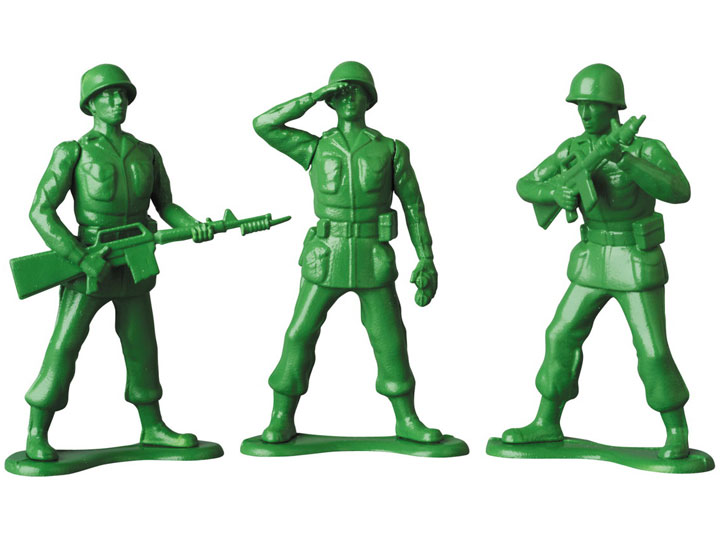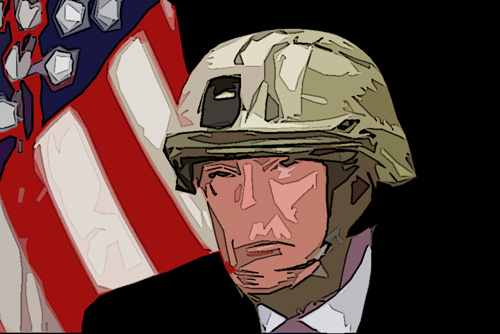The New York Times has a must-read account of the testimony against Special Operations Chief Edward Gallagher from fellow Navy SEALS.
“The guy is freaking evil,” Special Operator Miller told investigators. “The guy was toxic,” Special Operator First Class Joshua Vriens, a sniper, said in a separate interview. “You could tell he was perfectly O.K. with killing anybody that was moving,” Special Operator First Class Corey Scott, a medic in the platoon, told the investigators. …
…Video from a SEAL’s helmet camera, included in the trove of materials, shows the barely conscious captive — a teenage Islamic State fighter so thin that his watch slid easily up and down his arm — being brought in to the platoon one day in May 2017. Then the helmet camera is shut off.
In the video interviews with investigators, three SEALs said they saw Chief Gallagher go on to stab the sedated captive for no reason, and then hold an impromptu re-enlistment ceremony over the body, as if it were a trophy.
“I was listening to it, and I was just thinking, like, this is the most disgraceful thing I’ve ever seen in my life,” Special Operator Miller, who has since been promoted to chief, told investigators.
Gallagher was pardoned by Trump, as were two other soldiers convicted of war crimes. Trump considers these men to be his personal pets.
President Donald Trump’s took part in a Saturday night rally in South Florida, bringing two accused war criminals on to the stage as honored guests.
According to the Miami Herald, during his speech at Florida Republicans’ annual Statesman’s Dinner, Trump brought Army 1st Lt. Clint Lorance and Maj. Matt Golsteyn in front of the crowd. Trump controversially pardoned the two—along with former Navy SEAL Edward Gallagher—last month against the recommendations of senior military leaders. Lorance was serving a 19-year prison sentence for murder after ordering soldiers to open fire on three unarmed Afghan men in 2012, killing two. Golsteyn had been charged with premeditated murder after admitting to shooting a detained, unarmed Afghan man in 2010. Golsteyn killed the prisoner off-base and buried his body, only to dig it up later, bring it back to the base, and burn it in a pit used to dispose of trash, according to the Washington Post.
The men’s appearance at a party rally and fundraiser confirm that Trump sees political value in his interventions on behalf of soldiers who were charged by uniformed military prosecutors with the most serious crimes. After the pardons, the Daily Beast cited two sources who said they heard the president talk about how he would use the pardoned soldiers as political props in his 2020 reelection bid, with one saying they heard the president discuss “making it a big deal at the convention.”
However, a Military Times poll published this month says support for Trump among military personnel is going down and not up.
When asked specifically about Trump’s handling of military issues, nearly 48 percent of the troops surveyed said they had an unfavorable view of that part of his job, compared to 44 percent who believe he has handled that task well. That marks a significant drop from the 2018 Military Times poll, when 59 percent said they were happy with his handling of military issues, against 20 percent who had an unfavorable view.
See also the video.
The Military Times article didn’t go into much detail as to why Trump is falling out of favor among the troops. It did mention the firing of Gen. Jim Mattis as defense secretary as a big issue with the troops. Many were also disillusioned by the pullout from Syria.
It’s been said before that Trump has an adolescent boy’s view of warfare, and his view of soldiers borders on cartoonish.
The case of Major Mathew Golsteyn is now under review at the White House. Mathew is a highly decorated Green Beret who is being tried for killing a Taliban bombmaker. We train our boys to be killing machines, then prosecute them when they kill! @PeteHegseth
— Donald J. Trump (@realDonaldTrump) October 12, 2019
Depicting soldiers as dehumanized “killing machines” is something one used to see on the anti-war Left. It’s an insult to professional soldiers. But Bonnie Kirstian believes Trump identifies with war criminals. Like him, they are people who break rules.
The president’s affection for violence beyond the laws and norms of modern warfare is well-established. He expresses total confidence in the efficacy of torture, despite overwhelming evidence to the contrary, and insists it should be employed even if it doesn’t work (“They deserve it anyway for what they do to us”). In a 2016 op-ed, for example, Trump argued it is only political correctness that prevents the United States from drowning and beheading our enemies in the style of the Islamic State. He has waxed rhapsodic about the prospect of killing the families of terrorists — which is to say, murdering children because of the misfortune of their birth and slaughtering women who very possibly had no choice in their marriage. He has no interest in confining the U.S. military to the rule of law, whether domestic or international, instead envisioning himself as the war crime commander-in-chief: “If I say do it, they’re going to do it.”
Thus the twisted mercy Trump offers in pardoning war crimes is not a boon to the U.S. military. It is a degradation, a blood offering to Mars.
This enthusiasm for cruelty might be sufficient to get Trump to issue pardons for war crimes. He has made clear he doesn’t care whether these soldiers are innocent of what they are accused of doing and in fact believes they were right to do it if indeed they are guilty. But I think there’s another factor at work: Trump in a sense identifies with the men he has pardoned. He is giving them the indemnity he hopes for himself.
Adam Serwer wrote at The Atlantic,
On the campaign trail, Trump frequently invoked a false story about General John Pershing crushing a Muslim insurgency in the Philippines with bullets dipped in pig’s blood, declaring, “There was no more radical Islamic terror for 35 years!” He vowed to impose torture techniques “a hell of a lot worse than waterboarding.” Trump declared that he would “take out the families” of terrorist suspects, assuring skeptics that the military would not refuse his commands, even though service members have a duty to refuse orders that are manifestly illegal. “If I say do it, they’re going to do it.” …
…Many former officials have warned that Trump’s war-crimes pardons undermine “good order and discipline,” a jargony way to say that they signal the rules don’t matter. A military force where the rules don’t matter is not one that can fight effectively or with the necessary moral or strategic restraint.
Defenders of Trump’s pardons dishonor service members by treating them as conscienceless automatons who need make no distinction between combatants and civilians. But murder, under color of authority, is still murder. …
… Every service member who has faced combat has experienced the anguish of losing comrades, the difficulty of facing an enemy that disguises itself and does not obey the laws of war, and the frustration of a conflict seemingly without end. The Uniform Code of Military Justice provides for juries made up of service members to ensure that those who render verdicts are themselves cognizant of the exigencies of warfare. But the fact that a relative handful of service members responded to those difficulties by desecrating corpses, deliberately killing civilians, or engaging in premeditated murder illustrates that calling them “killing machines” is a profound insult masquerading as praise.
“I will always stick up for our great fighters,” Trump told the crowd at a rally in Florida yesterday. “People can sit there in air-conditioned offices and complain, but you know what? It doesn’t matter to me whatsoever.”
The seven Navy SEALs who told investigators that Gallagher shot unarmed civilians from his sniper nest, including “a girl in a flower-print hijab who was walking with other girls on the riverbank,” after being warned that doing so could “cost them and others their careers” were not sitting in an office. The soldiers who testified that Lorance ordered his unit to fire on unarmed Afghans who were “definitely not any type of threat” were not luxuriating in an air-conditioned building. They were at just as much risk on the battlefield, and yet they chose to adhere to the rules they were charged to uphold.
In another Atlantic article, Mark Bowden writes what he’s hearing from senior officers:
In 20 years of writing about the military, I have never heard officers in high positions express such alarm about a president. Trump’s pronouncements and orders have already risked catastrophic and unnecessary wars in the Middle East and Asia, and have created severe problems for field commanders engaged in combat operations. Frequently caught unawares by Trump’s statements, senior military officers have scrambled, in their aftermath, to steer the country away from tragedy. How many times can they successfully do that before faltering?
It’s very much worth reading Bowden’s piece all the way through. The top brass complain that Trump disdains experise; he is reflexively contrary; he seems not to grasp the concept of “strategy.” And he has a simplistic and antiquated notion of soldiering.
“He doesn’t understand the warrior ethos,” one general said of the president. “The warrior ethos is important because it’s sort of a sacred covenant not just among members of the military profession, but between the profession and the society in whose name we fight and serve. The warrior ethos transcends the laws of war; it governs your behavior. The warrior ethos makes units effective because of the values of trust and self-sacrifice associated with it—but the warrior ethos also makes wars less inhumane and allows our profession to maintain our self-respect and to be respected by others. Man, if the warrior ethos gets misconstrued into ‘Kill them all …’?” he said, trailing off. Teaching soldiers about ethical conduct in war is not just about morality: “If you treat civilians disrespectfully, you’re working for the enemy! Trump doesn’t understand.”
Having never served or been near a battlefield, several of the generals said, Trump exhibits a simplistic, badly outdated notion of soldiers as supremely “tough”—hard men asked to perform hard and sometimes ugly jobs. He also buys into a severely outdated concept of leadership. The generals, all of whom have led troops in combat, know better than most that war is hard and ugly, but their understanding of “toughness” goes well beyond the gruff stoicism of a John Wayne movie. Good judgment counts more than toughness.
At the same time, Trump’s recurring dissing of Gold Star families he believes are insufficiently loyal to him reveal that his claims to respect the troops are pretty damn hollow. He respects the troops only so far as they reflect his presumed power and glory. He’s fine with using them as props, such as in his ridiculous July 4 military parade that was really all about him.
So let him trot his toy boy soldiers out at his stupid rallies; let him show them off like prize steers. I suspect this will hurt his re-election chances more than help them.


